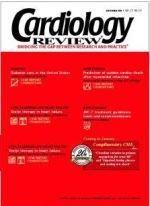Publication
Article
Cardiology Review® Online
Broiled or baked fish lowers risk of AF in older adults
In the first study to examine whether fish intake can affect atrial fibrillation (AF), eating tuna or other broiled or baked fish, but not fried fish or fish sandwiches, was found to lower the incidence of AF among older adults. The study was also the first to focus on the effects of the types of fish meals eaten, said lead author Dariush Mozaffarian, MD, MPH. The results were published in Circulation (2004;110[4]:368-373).
“The results suggest that regular intake of tuna or other broiled or baked fish may be a simple and important deterrent to AF among older men and women,” said Dr. Mozaffarian, instructor of medicine and researcher in the Channing Laboratory, Brigham and Women’s Hospital and Harvard Medical School
in Boston.
Using the database from the National Heart, Lung, and Blood Institute’s Cardiovascular Health Study, a prospective, population-based, multicenter study of 4,815 people aged 65 years or older who were enrolled in 1989 and 1990, the authors identified 980 cases of diagnosed AF over 12 years of follow-up. Participants had their dietary intake assessed at baseline through a questionnaire.
The incidence of AF was 19 per 1,000 person-years among persons who consumed tuna or other fish at least five times per week, compared with 33 per 1,000 person-years among those who consumed it less than one time per month (P < .0001).
After adjustment for potential confounders, persons who reported eating those fish one to four times per week had a 28% lower risk of AF, and those who had five or more servings had a 31% lower risk compared with those who ate fish less than once a month. Fried fish or fish sandwich consumption was not associated with a lower risk of AF.
An earlier study of a subgroup of the same population found that eating tuna or other broiled and baked fish correlated with increased biomarkers of long-chain n-3 fatty acids (omega-3 fatty acids) in the blood. No such association was found for fried fish/fish sandwiches, which suggests that these fish meals were either mostly lean (white) fish or that the preparation method affected the n-3 fatty acid content, according to Dr. Mozaffarian. Most fried fish or fish sandwiches eaten in the United States are lean (white) fish such as cod and pollock, he noted.
Further research is needed to evaluate the relationship between n-3 fatty acid supplements and risk of AF, he told Cardiology Review.
The American Heart Association’s dietary guidelines recommend that healthy adults eat at least two servings of fish per week, particularly fish such as mackerel, lake trout, herring, sardines, albacore tuna, and salmon.
In another study in Circulation (2004;110:1042-1046), researchers found that at age 40, the average lifetime risk for AF is 26% for men and 23% for women. “In other words, about one in four would develop AF before they die,” said Donald M. Lloyd-Jones, MD, ScM, assistant professor of medicine and preventive medicine at the Feinberg School of Medicine at Northwestern University, Chicago.
He and colleagues reviewed data from the Framingham Heart Study, in which 3,999 men and 4,726 women had documented examinations, medical histories, and electrocardiograms from 1968 to 1999. During the study, 936 participants developed AF and 2,621 died without prior AF. At age 80, the lifetime risk for AF did not change substantially despite fewer remaining years of life. The risk was 22.7% for men and 21.6% for women at age 80.
